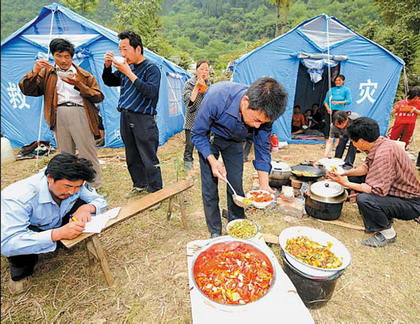Aftershocks, landslides hamper rescue
By Fu Jing (China Daily)
Updated: 2008-05-26 08:10
Updated: 2008-05-26 08:10
PINGWU -- In this remote county in Sichuan Province, the May 12 earthquake has left the mountains scarred and the survivors with tremendous difficulties amid frequent aftershocks, landslides and possible floods from quake lakes.
Two weeks after the quake, it remains extremely difficult for food, tents, medicine and other relief materials to reach this badly hit area, which remains cut off by landslides.
The only link to the outside world is a bumpy and narrow country road.
|
|
"If it rains or a big aftershock takes place, it is very likely we will be totally isolated again and more deaths may occur," said Chen Xianhui, head of the Pingwu's rescue headquarters.
With the main road cut off, locals are largely dependent on airdrops of food and water in this county where at least 5,000 have been confirmed dead and thousands remain missing.
Led by local people, thousands of soldiers are risking their lives, climbing the steep mountains to search for villagers who fled to the deep forests to escape death
"Hidden in the forests, some were even eating leaves when we found them," Captain Huang Bo, told China Daily. Huang and his troops have rescued about 1,000 villagers in deep mountains near the town of Shuiguan.
And the soldiers are also racing against time to resettle people in areas likely to be flooded by two big quake lakes surrounded by mountains and landslides, which contain around 170 million cubic meters of water between them.
Chen said the death toll in his county, with a population of 200,000, is expected be at least 5,000.
Although 168,000 locals have been made homeless, helicopters have so far dropped just 100 tents.
Mountainous area
The county, 300 km from the quake's epicenter at Wenchuan, has more than 400 rivers and over 90 percent is more than 1,000 meters above sea level. The area is also sparsely populated, with around 30 people per sq km.
This has added to the difficulties in locating those who remain missing.
And as time passes by, some of them may have starved to death.
Baima, Nanba, Shuiguan and other towns are at the foot of these picturesque mountains, with a river flowing from one end to the other.
So when the May 12 quake struck it brought down tons of rocks and a massive flow of mud from the mountains, intensifying the extent of the damage.
"Nearly all the towns have been flattened in mountainous areas," said Chen.
The once green mountains are now scarred and covered with dust, sand and rocks. Some of the boulders are hanging so precariously that passers-by are even afraid to cough for fear of triggering a landslide.
As a result of landslides, it now takes five hours to travel from the city of Jiangyou to Pingpu, a journey which takes normally just one-and-a-half hours.
"Before driving across a section affected by a landslide, you need to first look carefully and then get across it as fast as possible," said driver Zeng Xiaohong. "Otherwise, a falling stone may hit you."
Zeng, 42, is an experienced driver who travels from Chengdu to Lhasa all the year round. "That road is dangerous and the road to Pingwu has become the narrowest and most dangerous I have seen."
A strong earthquake with a magnitude of 7.2 on the Richter scale hit the province's northwest corner from Songpan to Pingwu 32 years ago.
Between these big earthquakes, thousands of small tremors have shaken this area almost every day.
"I am used to slight earthquakes and feeling the chair shake in my office," said Wang Jinrong, the county's spokesman.
But, on May 12, Wang said the force of the quake threw him to his office door, belongings were scattered on the floor and the windows were smashed.
And then all of his colleagues dashed from the third floor to the open air.
Luckily, the office building has not collapsed.
Before communications between the county and the outside world were restored last week, the only way the local government could get information out was by getting messengers to walk around 150 km.
"As we are on the earthquake belt, it's very easy to encounter aftershocks," said county rescue headquarters head Chen Xianhui.
More than 150 aftershocks measuring 4 or above on the Richter scale have hit the county since the May 12 quake, with some surpassing magnitude 6.
"These have caused more landslides and road closures," Chen said.
"And if it rains and more aftershocks happen, our situation will get even worse."
|
||
|
||
|
|
|
|
